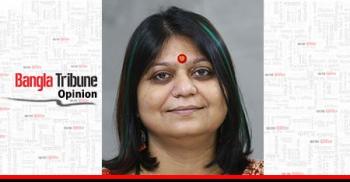 Recently three young ladies sat beside the Rabindra Sarobar, a place for recreation in Dhaka city. They were talking about harassment in public transport, the current burning issue. They were not very comfortable because of the mid day heat of May.
Recently three young ladies sat beside the Rabindra Sarobar, a place for recreation in Dhaka city. They were talking about harassment in public transport, the current burning issue. They were not very comfortable because of the mid day heat of May.
One said: I am not comfortable in any public transport. So I have to spend more money as daily conveyance.
Second one: I don't even think of walking or going out alone after evening.
First (reminding): But all harassment happens in broad daylight, dear.
Third one: is there any solution? And where is our rights activists who can lead to change the society?
I want to start with the last question: Are Women’s rights activists active enough? And where is their protest and social awareness? The situation is worse now than any other time as the third eye of society is not active in the proper way. Who are they: the activists.
The study titled ‘Roads free from sexual harassment and crash for women’ said, around 94% women commuting in public transport in Bangladesh had experienced sexual harassment physically, verbally and in other forms. This research conducted by development organization Brac. Another study conducted by Action Aid reveals that one in every four female commuters in Dhaka city faces sexual harassment by male passengers and transport workers in public bus.
One student from private university and another from government collage claimed that last month that, they were harassed physically and verbally in public transport and in both cases they jumped from bus to rescue themselves. Finally, Earlier in February, passengers’ welfare platform Bangladesh Jatri Kalyan Samity published a report which stated that at least 21 women were either raped or gang-raped on public transportation across Bangladesh in the last 13 months.
In this situation, victims are not comfortable to file any case as there are many hassles to handle and in this patriarchal society families are not ready to take any responsibility yet. And unfortunately, our women’s rights bodies have become almost inactive in recent issues. They have worked on some funded projects. So, online activists, writer groups, student organisations from public universities have mobilised women’s rights issues, particularly on sexual harassment.
There is no doubt that in the last four decades Bangladesh has made significant improvements in empowering women. As a result our women have become visible. Obviously, the women’s movement in Bangladesh played a vital role for this change. In the eighties and nineties, women’s rights activist identified their role and they actively participated. But by beginning of this century all activism has become a nine-to-five job.
What has happened now?
1. ‘Top’ rights activists behaving as ‘interest groups’ not as an oppositional force;
2. NGOisation has affected the autonomy and accountability of rights bodies;
3. Rights activists dependent on personal relationships with the state bureaucracy;
4. They have not any influence over national policy and political debates;
As women organizations have largely been organised under NGOs they have lost their characteristics. Social monitoring, engagements, awareness programs are also missing. So, the voice raising capacity and continuous protest have collapsed. Demonstrations take place, but is that enough to change and influence the mindset of patriarchy? “The answer is blowing in the wind”.
Udisa Islam is the Chief Reporter of Bangla Tribune


